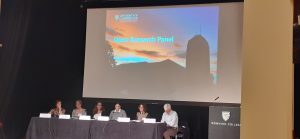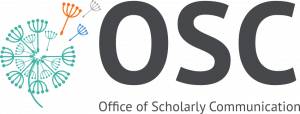2017 was an exciting year for training our library community. As well as continuing to cover the basics of research support, the OSC was able to introduce new topics and new methods of delivery to ensure that Cambridge library staff have all the information they need to support the research community. In this blog post our Research Support Skills Coordinator Claire Sewell reflects on the successes of the past year and her plans to make 2018 even better.
This time last year I was reflecting on my first full year in my role, having started in November 2015. After more than two years in the role some things have remained constant but there have also been a great many changes in training, so it seemed like a good idea to stop and reflect again.
The OSC runs two parallel professional development schemes for library staff: Supporting Researchers in the 21st Century and the Research Support Ambassador Programme. Supporting Researchers is open to all library staff and offers a regular programme of training in areas related to research support throughout the year. The Research Support Ambassadors programme is a more intensive programme which runs every summer and is designed to create a library workforce who feel confident in helping researchers with their queries.
Supporting Researchers in the 21st Century
The world of the academic library is changing and it’s important that institutions work to equip the staff with the knowledge they need to take advantage of these changes. The Supporting Researchers programme offers a range of training opportunities from general talks to in-depth workshops which are designed to help staff keep on top of the rapidly changing world of scholarly communication.
In 2017 we ran twenty-three training events catering to the needs of over four hundred staff. In addition to covering some of the expected areas such as Open Access and Research Data Management we looked at some new areas such as Text and Data Mining and predatory publishing. These sessions proved to be a hit with attendees, with 70% of those attending rating the sessions as ‘excellent’. They were also enthusiastic in their feedback:
Excellent session on predatory publishers. We’ve started to get a lot of questions in this area and knowing more about it came at the perfect time
It was really engaging and a perfect introduction to the topic. I only had a vague idea at the outset as to what predatory publishing is but by the end of it I felt really well-informed (and in a short space of time!)
In order to help staff plan their time and attendance we experimented with forming sessions into mini programmes which resulted in our Librarian Toolkit sessions on Helping Researchers Publish and Open Access. This seemed to be successful so it’s something we’ll be continuing in 2018. By far our most successful session was How to Spot a Predatory Publisher, which was delivered in direct response to demand from staff who were getting a lot of questions from their users on the topic. It was so successful that we’ve gone on to produce some local guidance and a webinar which has over 300 views to date.
Research Support Ambassador Programme
In 2017 the Research Ambassador Programme ran from August to October and attracted eighteen participants from across colleges, departments and the University Library. We tried something a little different this year by making most of the training available online. Librarians are notoriously busy people and coupling this with summer holidays and the introduction of a new library management system meant that it would have been impractical to schedule in a host of face-to-face sessions. The initial introductory workshop ran as an in-person session to allow Ambassadors to meet each other and put faces to names but all other sessions were delivered as interactive webinars.
Although formal feedback is still being collated, initial responses have been positive:
I feel much more confident now that I have a good overview of all the issues confronting researchers and I will be able to know how to train researchers and who to refer them to for more information
Thanks for the programme. The content was really interesting and delivering via webinar was helpful as I didn’t have to leave my desk. I feel much more confident in dealing with researcher questions now.
Now that we have three cohorts of past Research Ambassadors in Cambridge it’s time to expand the programme for those still wishing to be involved. It’s hoped that this will create a community of research support librarians and strengthen it into the future as new staff take part in the programme.
Webinars
Introducing a new training format is always a challenge but in the case of OSC webinars it’s one where the hard work has paid off. Many library staff have commented over the past two years that although they would like to attend training session they can’t due to issues with library staffing and other commitments. Repeating sessions and varied scheduling helps to some extent but we felt that more could be done. Having attended many webinars myself I knew they were a great way to attend training without having to leave my desk, especially if recordings could be accessed at a later date.
Over the course of 2017 the OSC delivered a total of nine webinars for library staff. Feedback on the format from library staff was positive:
Working in a small Library where most staff are part time makes it difficult to get out of the Library to attend training so being able to take part online was great.
I really enjoy the ability to listen back at a convenient time; I often cannot leave the library at short notice due to lack of cover, or unforeseeable research enquiries that overrun and unfortunately take precedence over courses etc.
Nice and flexible – can watch from anywhere!
As a result of this success, the webinar format is now being used for additional training for both the research community and an audience beyond Cambridge.
Moving beyond Cambridge
It’s also been a busy year for training library staff outside Cambridge. In May I went to talk to CPD25, the staff development programme of the M25 Consortium of Academic Libraries on Making the Modern Academic Librarian and gave a presentation on the Librarian as Researcher to CILIP in Kent in November. I was also lucky enough to visit Salzberg to talk about the skills librarians can bring to the support of Text and Data Mining. The OSC has also been involved in talking to other interested stakeholders about the wider need for research support training for library staff which has led to some exciting progress.
We’ve also been busy talking about Cambridge initiatives to the wider world. In April 2017 I went to LILAC – the major information literacy conference for librarians – in Swansea and gave three presentation including a poster on the Supporting Researchers in the 21st Century programme, a presentation on the Research Support Ambassador programme and a workshop on Engaging Students with Research Data Management. This has led to a wider interest in these programmes and the issue of research support training more widely.
Perhaps the biggest impact we’ve had has been the publication of an article on the Research Support Ambassador Programme in the New Review of Academic Librarianship. To date this has had over two thousand views and was the most read article published in the journal in 2017. I was very excited to discover this week that it has its first citation and that it has been chosen to receive a cartoon abstract as part of the launch of the publisher’s new librarian platform this year. Lots to look forward to!
Future plans
So, what next? Plans for the Research Support Ambassadors are moving forward and we have several interesting sessions lined up for our librarians already. There has also been a lot of interest in offering training to a wider audience starting with a session on Moving Into Research Support in February and more to come. Hopefully there will also be more publications in the future and of course updates on this blog. The OSC is very much looking forward to working with our library community throughout 2018 and beyond to bring them more exciting training opportunities.


